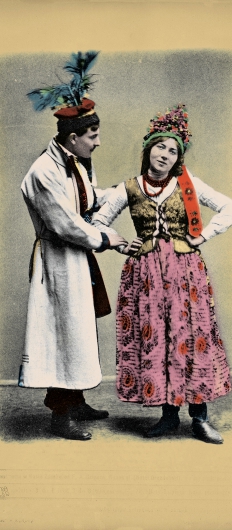Anna Maria Krysiak
Currently in cast

The Wedding
The Juliusz Słowacki Theatre in Krakow - The Grand Stage
Nearest dates
Author: Stanisław Wyspiański
Premiere: 16.03.2024
The Juliusz Słowacki Theatre in Krakow - The Grand Stage
Nearest dates
The secret of Stanisław Wyspiański's Wesele (The Wedding) lies primarily in the way it resonates with theatregoers because – as Jan Błoński once wittily stated – Polish audiences are never bored watching The Wedding. Almost everyone agreed with the portrayal of our nation contained in Wyspiański's drama: be it socialists, nationalists, democrats or conservatives. And yet The Wedding depicts a social and class conflict, which is ongoing and constantly renewed, impossible to resolve, antagonising the players in the field of politics in many different ways, fuelled by anger, rage, a sense of injustice and desire for revenge.
The drama's grand finale, heading in long cadences towards a state of lethargy, disarmament, and a straw-wrap dance, used to be interpreted as the bitter, shocking truth about our social impotence, apathy and anomie. Or is it perhaps the other way around? Might this perverse, triumphant and monumental scene where social energy is slaughtered, trigger a sense of relief, liberate us from the fear of gory violence, and provide a blissful sense of elevation and self-righteousness? Is the drama's pulsating threat of unleashing revolutionary elements stifled by the illusion of community and the symbolic violence that always accompanies it? Is Wyspianski's drama haunted by the spectres of the national subconscious, as we tend to believe, or rather by the cadavers of history with a far greater reach?
Premiere: 10.10.2025
The Juliusz Słowacki Theatre in Krakow - The Grand Stage
Nearest dates
We all know the first lines of the invocation opening ‘Pan Tadeusz’. Lithuania is Adam Mickiewicz's homeland, which the poet lost just like one would lose their health. In recalling Lithuania, the first thing that springs to the poet's mind are its beautiful farmlands. But is he at all concerned with the stories of the people who cultivated those fields? ‘Pan Tadeusz’ is clearly focused on the story of the nobility, as its title suggests; after all, it tells the story of the last nobleman's foray. The national epic seems to completely ignore the rest of the world. So who is it written for? What do we, as contemporaries, actually have in common with the story of incessantly bickering nobles; a story that ends with the contractual marriage of a fourteen-year-old girl to the titular ‘Pan’? What does this story really teach us today? And what is it actually about? Are we supposed to admire it or hate it?



